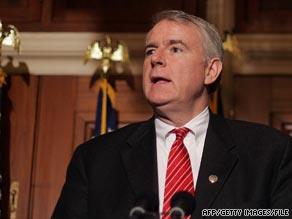
As part of my ongoing series of interviews with some of 2010’s most interesting candidates for elected office (well, interesting to me anyhow), last week I had an opportunity to speak with Milwaukee Mayor Tom Barrett, the front-runner for the Democratic gubernatorial nomination.
As our interview started, I asked Barrett how signature collection to get his name on the ballot was going, and he said it was going “very, very good.” Barrett added that thanks to his campaign’s extensive volunteer group, his campaign collected well beyond the required number of signatures needed to get on the ballot. Barrett added that at his core, he’s a “grassroots guy,” believing that democracy is the ultimate participatory sport, and so he is always excited to see people get involved in the political process.
Our interview continued with me asking Barrett what he learned from his 2002 gubernatorial campaign, in which he finished second in the Democratic primary to eventual Governor Jim Doyle. Barrett noted that he enjoyed the entire 2002 from start to finish, with the exception of the last 15 minutes, and he added that it was exhilarating to meet all the people he met while on the campaign trail. Barrett also said that since his 2002 campaign – and especially just prior to him announcing his candidacy in 2009 – he came to the realization that state government needed some adult supervision.
I had an opportunity to talk to Barrett about his 67-page plan to “Put Madison on a Diet,” a plan that Barrett says would save Wisconsin taxpayers at least $1.1 billion while making significant reforms to change the way state government works. Barrett noted that Wisconsin’s next governor will take office with a $2.3 billion structural deficit (a number that’s since been upped to $2.5 billion), and he noted, “We need to put state government on a diet.” When I asked Barrett which part or parts of his proposal that he would be most excited to see implemented if he’s elected, Barrett actually cited a few of the proposals within his plan, starting with his plan to combine state and local government employees’ purchasing power statewide, which would save an estimated $339 million. Barrett noting that by combining the purchasing power of state and local government employees, the state would have bargaining power with which to negotiate with health insurance companies for lower premiums, likening that bargaining power to “fighting an 800 pound gorilla with your own 800 pound gorilla.”
As we continued to talk about Barrett’s plan to “Put Madison on a Diet,” he mentioned that if elected, he’d implement a comprehensive sunset review of all regulatory programs, state boards, and commissions to make sure they’re still relevant and needed. Barrett also said he’d work to move state government into the 21st Century with technological upgrades, which could save taxpayers approximately $175 million.
Asked to name one accomplishment during his time as Milwaukee’s Mayor that he’s most proud of, Barrett was quick to cite the revitalization of the Menomonee River Valley as one of his crowning achievements. Barrett noted that his administration was able to take land that was either not utilized (or severely underutilized) and get that land back on the tax rolls while creating jobs in the process. Barrett also cited the redevelopment of the Menomonee River Valley and the creation of jobs there as a stark difference between himself and one of his Republican gubernatorial opponents, Milwaukee County Executive Scott Walker, noting that while the City of Milwaukee has revitalized the Menomonee River Valley and created jobs, Milwaukee County under Scott Walker has not yet developed the land it owns in the Park East corridor. Barrett cited the lack of strong, proactive leadership as the difference between the City’s Menomonee River Valley redevelopment efforts and the County’s Park East redevelopment efforts, adding, “It’s all about getting things done.”
Another accomplishment Barrett cited was was his decision to make cuts in City spending in order to pay in full the City’s $49 million pension obligation. Barrett noted at the time he became aware of the $49 million pension obligation, he remembers being told to borrow the money, and he referred to that as a “gut check moment,” adding that he made the decision to pay the City’s pension obligation rather than borrow the money because he knows that people are tired of politicians who kick the can down the road when it comes to borrowing money to pay current obligations. Barrett noted that while he made the decision to make cuts in order to pay in full the City’s $49 million pension obligation, Scott Walker chose to borrow $400 million to fund Milwaukee County’s pension obligations.
Moreso than any interview I’ve had with a candidate for elected office, my interview with Mayor Barrett was remarkable for its laser-sharp focus. Mayor Barrett was clear and concise in his responses to my questions, and he demonstrated that he has a clear plan on how he’d cut spending and reform state government if elected governor.


That risky move by Walker to borrow and invest that $400 million will be the next pension scandal.
Agreed, but unfortunately Scott Walker probably won’t be around once that scandal breaks, so someone else will be left to pick up the pieces.
Austerity is all find and good. However, I would suggest that now is the time to borrow. Interest rates are now lower than at any point in the last 50 years. Sound fiscal policy would call for borrowing more funds at low interest rates to pay off high interest debt.
I’m sure a number the readers of the site have demonstrated more fiscal acumen than both Walker and Barrett by refinancing their mortgages.
I know Tom Barrett years ago when he was first elected to the legislature. He was a good, decenne, common-sense fellow in addition to being a solid progressive.